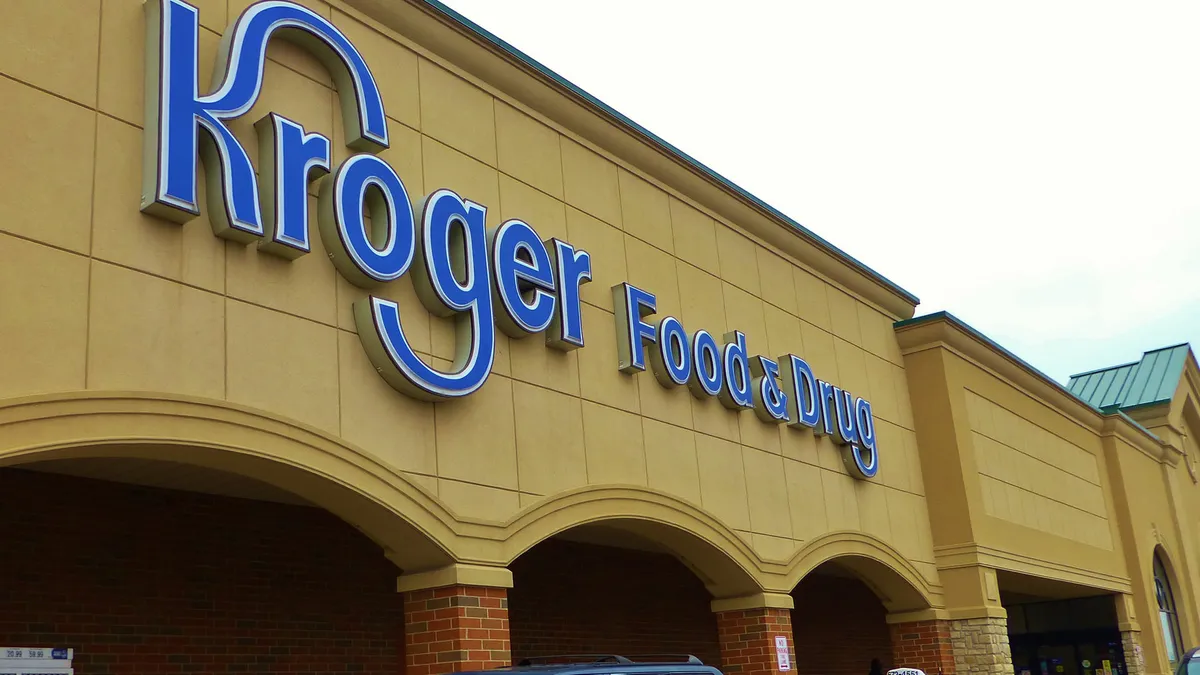Dive Brief:
- Price checks conducted by Barclays in Nashville, Tennessee, found that Kroger has ceded its pricing advantage in perishables to two key competitors: Walmart and Sprouts Farmers Market.
- When comparing a basket of 117 items, representatives from the investment firm found that Walmart’s “fresh” items were 6.6% cheaper than Kroger’s, compared to the Cincinnati-based grocer’s 3.6% price advantage a year ago. In a comparison of 130 natural and organic products, meanwhile, Barclays found that Sprouts Farmers Market had overtaken Kroger in natural and organic perishables pricing, gaining a 2.4% advantage. Sprouts had an even larger advantage in produce, with prices 25.5% cheaper than Kroger’s. Barclays also examined prices at Whole Foods and found the grocer to be narrowing the price gap with Kroger.
- Kroger remains competitively priced on center store items, lagging Walmart 6.4% while beating Sprouts and Whole Foods on specialty items by 14.4% and 20.8%, respectively. Still, the firm expressed puzzlement as to why Kroger had ceded so much ground on perishables. “While [Kroger] clearly has a scale advantage in the commoditized categories — and could be using its scale to reduce prices — perishables drive frequency, so we are perplexed as to why the price gap would have widened vs. a year ago,” analysts wrote in a note to investors.
Dive Insight:
These findings highlight why Kroger’s margins are under so much pressure these days: It’s getting squeezed on both the high and the low ends of the market.
Walmart has been steadily lowering prices to compete with dollar stores, discounters and traditional competitors like Kroger. And while Kroger is never going to beat Walmart on overall pricing, it can stay competitive in key categories. Losing its advantage in perishables pricing is a worrying sign for the grocer.
It’s particularly worrying given Walmart’s efforts to broaden its reach. For years, the mega retailer and Kroger have served separate consumer groups. But now, through a range of efforts that include its rapid e-commerce expansion, stocking more premium and local products, sprucing up its stores and acquiring upscale companies like Bonobos, Walmart has its sights set on Kroger customers and beyond.
A lot of attention has been paid to the threat Whole Foods and Amazon poses to Kroger, but as Barclays’ price checks show, Sprouts is also problematic. Targeting traditional retailers is core to the Phoenix-based upstart’s strategy right now, and fresh produce pricing is a very effective weapon to wield in this fight. The category has always been a major focus for Sprouts, and these days it’s also targeting prepared foods and private label, just like Kroger.
While Kroger’s store growth has stalled, Sprouts is expanding by around 30 locations a year. It just moved into the competitive mid-Atlantic region, and should become a thorn in the side of Kroger and other legacy retailers as it continues to grow.
As for Whole Foods — the company has made some high-profile cuts that reports claim were more about marketing than actually bringing down the company’s price premium. But Barclays' checks indicate the grocer has been making some steady progress behind the scenes.
Whole Foods may need to make deeper cuts to stay competitive with the likes of Kroger. But owner Amazon is targeting value in other ways, primarily through its Prime loyalty program, which now offers credit card discounts and free two-hour shipping.
Kroger hasn’t sat idly by in all of this. It has trimmed its operational costs along with prices, zeroed in on key growth streams like private label and meal kits, and invested in store technology. It’s a dizzying amount of work for the nation’s largest retailer, and it’ll have to continue in order for Kroger to keep up.









